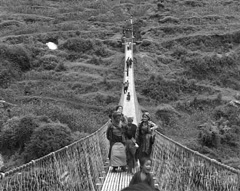We Corner People
Hami Kunako Manche NEPAL / 2007 / Nepalese / Color / Video / 49 min
NEPAL / 2007 / Nepalese / Color / Video / 49 min
Director, Script, Editing, Producer: Kesang Tseten
Photography: Siddhartha Shakya
Editing: Melissa Hacker, Prem BK
Sound: Prem BK
Source: Kesang Tseten
Children, adults, and animals of a remote village in Nepal that has no electricity or shops, and is cut off from everything by a river, pride themselves on being “corner people.” A bridge is to be built crossing the river which occasionally claims victims due to rising waters. The film portrays the residents singing the joys of life with reckless abandon in a stifling climate of abject poverty, as they happily make the bridge together, all the while discussing shamanism and Christian missionaries, letters from one of their number off in Kuwait, and conflicts between Maoist and government troops. It is eventually completed, bringing a moment of fantastical calm to the village as the villagers dance and pray in front of their new bridge, which stands in a misty haze.
[Director’s Statement] When the Swiss NGO Helvetas, which has been helping communities in Nepal to build trail bridges for decades, asked me to make a film, I hesitated. A few thousand trail bridges had been built, and so there was nothing new. Then I had an idea; it was simple: I would focus on the village rather than on the bridge.
The village did have particular traits: It was markedly poor, with no electricity, development, or jobs, not enough food, not a single shop, and no other settlements anywhere close to the village. The villagers’ favorite refrain was “we who are of this corner.” While there are many villages in such depraved circumstances, not many in the center know of this; what was interesting was how people perceived their condition and its relation to their culture, behavior, and self-image, even at the times they resisted coming together to build the bridge.
For me, what helped make the village story distinct is that, as I asked the obvious questions, regarding the benefits of the bridge, someone, then another, and then yet another, told me, sometimes off-handedly, that the river had killed a young bride. I decided then that, emotionally, it was the young woman’s death that haunted the village, stirring them to demand the bridge, even if they didn’t say this explicitly. This personal thread forces those of us from outside to confront the village as a particular entity, made up of individuals with emotions, rather than just a nameless poor village out of hundreds out there that needed development.
 Kesang Tseten
Kesang Tseten
Kesang Tseten’s We Corner People won Best Nepali Documentary at the Kathmandu International Mountain Film Festival (2006) and was selected as the inaugural film for the 2nd International Film Festival on Water, “Voices from the Water.” On the Road with the Red God: Machhendranath won the Grand Prize at the 2006 Kendal Mountain Film Festival, as well as a Mention for the Prix Nanook-Jean Rouch at the 2006 Bilan du Film Ethnographique, and was voted Best Documentary of the Decade by the Nepal Motion Picture Association in 2005. We Homes Chaps was featured at Film South Asia ’01 and the 2002 Margaret Mead Film & Video Festival. Tseten wrote and co-directed a fictional short for teenagers, Listen to the Wind. He wrote the screenplay for Mukundo (Mask of Desire), co-produced by Japan’s NHK and Nepal’s submission to the Academy Awards in 2001; it was awarded Best Script by the Nepal Motion Picture Association. He wrote the original screenplay for Karma, soon to be released. |
